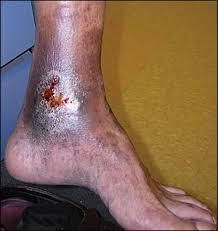Millions of patients every year are seen in wound care centers for the treatment of their foot and leg ulcers. This is absolutely the correct place for anyone who has had a wound that is “non-healing” or “chronic”. That is, a wound that is still there after four weeks. Unfortunately, sometimes the physicians in these wound care centers are quick to put on expensive savs or other advanced treatment options. After all, isn’t that why the patients go to the wound care center instead of just their physician’s office? Partially. Good wound care centers treat by guidelines.
Guidelines are a scientifically proven set of steps that have been shown to help wounds heal faster. For EVERY wound on the leg or foot, the very first step is to assess BLOOD FLOW. This means that every patient with a leg or foot wound that hasn’t healed in four weeks MUST be seen by both a vascular surgeon AND a podiatrist (foot specialist).
The vascular surgeon will assess the circulation and order appropriate diagnostic tests, such as vascular ultrasounds to look at the blood flow. This is important to examine, as a large number of the patients who have ulcers, have not previously been diagnosed with an arterial or venous problem. Without fixing the underlying cause of the ulcer, even if it does heal initially, it will soon recur, and cause further problems. It is important for patients to take an active role in asking for these referrals so that the problem does not progress and become a wound that can lead to an amputation.
If you or anyone you know is diabetic and suffers from non-healing leg wounds call today to schedule an appointment at our office. South Bay Vascular Center and Vein Institute Surgeons are recognized as the regional experts in wound care healing and amputation prevention. Our Vascular Surgeons have performed more lower extremity re-vascularizations than any other surgeons in the region and offer hope when others say there is none.
Call today at 408-376-3626
